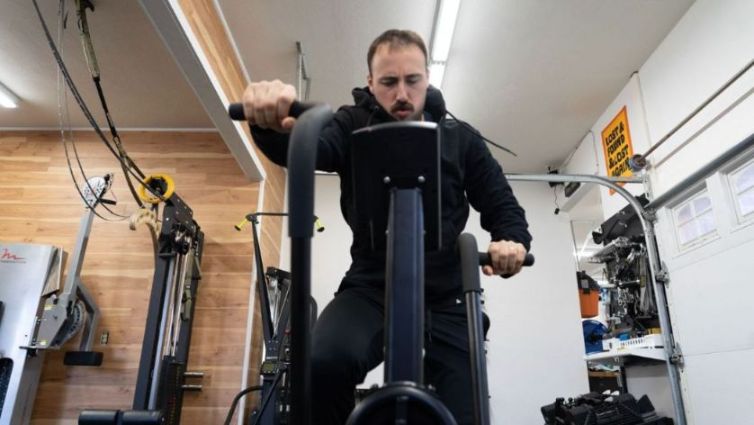We test and review fitness products based on an independent, multi-point methodology. If you use our links to purchase something, we may earn a commission. Read our disclosures.
You either love doing cardio or you dread it, and there are very few people who fall in between. No matter how you feel about it, cardio is an important part of any fitness program and should be done regularly to reduce your risk of diseases and maintain your overall health.
You might be wondering what does cardio do to your body and why it’s so vital for your physical and mental well-being. Well, that’s what we’re here for. By the end of this piece, we hope you’ll understand why hopping on an exercise bike or treadmill, or just going for a run, will benefit you in the long run even if it means some short-term discomfort.
Benefits of Cardio
Cardiovascular exercise is mostly connected with improved heart health, and while that’s a major benefit, it’s hardly the only reason why you should get your heart pumping. Studies have also shown that regular cardio has been associated with1 better mental health, lower blood pressure, weight loss, and managing conditions such as diabetes.
In other words, it can increase your quality of life, help you achieve your fitness goals, reduce your obesity risk, and more. We’ll go more in-depth into the benefits of cardio below.
1. You Burn Fat
Cardio is the most efficient way to burn calories and achieve a caloric deficit, which is when you burn more calories than you consume. This can lead to weight loss.

Harvard Medical School found that a 185-pound man burns an average of 294 calories for every 30 minutes of biking at a moderate intensity, but only burns 252 calories with intense weightlifting for the same amount of time. It should be noted that weightlifting, or any other type of resistance training, increases your resting metabolic rate, or the number of calories you burn simply by existing, because it helps build muscle.
2. Better Mental Health
It’s no secret that exercise and mental health are closely linked, but did you know that your cardiorespiratory fitness can be an indicator of your mental health? That’s according to one meta-analysis2 that found people with low cardio fitness levels were more likely to have a mental disorder, such as anxiety or depression, than those with high cardio fitness levels.
Why is this? Research3 has found that cardio exercise increases blood flow to the brain and causes different parts of the vital organ to interact with each other, specifically, the hypothalamic-pituitary-adrenal region and the hippocampus, both of which are vital in controlling our mood and motivation. These interactions have been shown to decrease negative mental health symptoms.
3. Boost Brain Power
How many of you have been stuck on an assignment and gotten so frustrated you decided to go on a walk or run, only to figure out the issue at hand during your jaunt? It turns out cardio exercise activates a brain molecule4 known as brain-derived neurotrophic factor, which is responsible for repairing brain cells and creating new ones.
It’s also linked with a larger hippocampus, the part of the brain responsible for storing and retrieving memories.
4. Improve Heart Health
This is perhaps the most widely known benefit of cardio, but it bears repeating—it’s very good for your ticker. The heart has colloquially been called the “strongest muscle,” and while that’s not technically true (it’s a muscular organ) we’ll go along with it just because it allows us to make a good analogy.

Just as a biceps curl makes your biceps stronger, cardiovascular exercise strengthens and conditions your heart. Multiple studies5 have found that the hearts of people who regularly engage in cardio exercise work more efficiently than the hearts of those who don’t.
Moreover, cardio exercise has been linked with6 a decreased risk of heart disease and heart attacks.
5. Lowers Blood Pressure and Cholesterol
Cardio exercise can actually make our blood vessels expand7, which allows blood to pass through them much easier and reduce one’s blood pressure and cholesterol levels. It should be noted the same effect can be found with resistance training, which is why it’s recommended for those with high blood pressure.
6. Regulates Blood Sugar
Cardio training has been linked with improved health metrics that aren’t just weight loss, such as better blood sugar levels. According to studies8, regular exercise can help regulate a number of bodily functions that allow for better glucose moderation—in English, it allows our body to maintain optimal blood sugar levels, which can lead to a decreased risk of diabetes.
7. Better Sleep
If the only thing that’s running is your brain at night, then it might be time to start pounding the pavement. Dozens of studies9 have found cardio exercise can help increase the amount of shut-eye one gets in a night, in addition to improving sleep quality.
8. Strengthens Immune System
That’s right, cardio might be better than Vitamin C or your grandmother’s chicken noodle soup in helping you ward off any sicknesses (sorry, Babushka).
During cardio exercise, your body actually starts to increase the number of immune cells10 it circulates. These cells’ job is to detect and fight against infection. Think of these cells as little soldiers ready to go to war and cardio exercise as the drill sergeant with an overly loud trumpet calling them to action.
9. Affordable and Easy to Do
Alright, this isn’t an example of what cardio does to your body, but we feel it’s important to highlight that cardio isn’t like weight training, which requires special equipment. You can run just about anywhere with minimal gear, go for a swim if you’re near a body of water or pool, or just climb your building’s stairs.
What Counts as Cardio?
Cardio is anything that gets your heart rate up and utilizes your body’s aerobic metabolism, meaning that oxygen is involved in the molecular reactions that provide your body with the energy needed to complete the exercise.
Here are some different types of exercises that count as cardio training:
- Brisk walking
- Running
- Swimming
- Climbing stairs
- Biking
- Using an elliptical machine
- Dancing
- Jump Roping
- Kickboxing
- High-intensity interval training (HIIT)
How Much Cardio Should You Do?
The Centers for Disease Control and Prevention’s (CDC) physical activity guidelines recommend adults get 150 minutes of moderate-intensity aerobic exercise or 75 minutes of high-intensity cardio per week.
You can split this up any way you want—30 minutes of moderate-intensity aerobic exercise five days a week, 25 minutes of high-intensity cardio three days per week, or any other combination that works for your lifestyle.
Cardio vs Strength Training
I think I speak for most certified personal trainers when I say one of the questions we’re tired of being asked is, “Should I do cardio or strength training?” The answer is, has always been, and always will be, both.
We’ve just listed many of the benefits of cardio, and many of them are also applicable to strength training. But strength training is also crucial11 for increasing your resting metabolic rate (the number of calories you burn simply by existing), building muscle, strengthening your bones and joints, and reducing your overall injury risk. So make sure your workout routine consists of varying intense exercises.
What Does Cardio Do To Your Body: Final Thoughts
Does cardio exercise have its setbacks? Of course, but so does anything in life, and as one researcher put it, “The problems associated with aerobic exercise are minimal compared with its benefits1.”
Not only does it help protect our hearts, but it can also improve our brain function, mental health, and immunity, and it decreases our risk for serious conditions like diabetes.
The CDC and the American Heart Association recommend we get 150 minutes of moderate-intensity cardio exercise or 75 minutes of high-intensity cardio exercise, meaning you can spend as little as 25 minutes per day doing cardio and reach that goal while listening to a podcast or watching your favorite show.
What Does Cardio Do To Your Body: Q&A
How does cardio change your body?
Cardio changes your body by potentially putting you in a caloric deficit, which can lead to weight loss, but has also been linked to improved brain activity, better cellular function, and improved mental health.
What happens if I do cardio every day?
You’re going to get very tired and burn out very quickly. No form of exercise should be done every day, as your body needs to recover from the exercise-induced stress to perform at optimal levels. Too much exercise can increase your cortisol levels, which can lead to decreased immune function and performance.
Does cardio burn belly fat?
Cardio exercise burns calories, which can put you in a caloric deficit and lead to weight loss. There’s no way to specifically target belly fat, so if you’re looking to bring your gut down, you’ll need to stay in a caloric deficit.
What are three benefits of cardio?
Three benefits of cardio include better heart health, improved mental health, and a decreased risk of conditions such as diabetes.
References
- Mersy DJ. Health benefits of aerobic exercise. Postgrad Med. 1991;90(1):103-112. doi:10.1080/00325481.1991.11700983
- Kandola A, Ashdown-Franks G, Stubbs B, Osborn DPJ, Hayes JF. The association between cardiorespiratory fitness and the incidence of common mental health disorders: A systematic review and meta-analysis. J Affect Disord. 2019;257:748-757. doi:10.1016/j.jad.2019.07.088
- Guszkowska M. Wpływ ćwiczeń fizycznych na poziom leku i depresji oraz stany nastroju [Effects of exercise on anxiety, depression and mood]. Psychiatr Pol. 2004;38(4):611-620.
- Trombetta IC, DeMoura JR, Alves CR, Carbonari-Brito R, Cepeda FX, Lemos JR Jr. Serum Levels of BDNF in Cardiovascular Protection and in Response to Exercise. Níveis Séricos do BDNF na Proteção Cardiovascular e em Resposta ao Exercício. Arq Bras Cardiol. 2020;115(2):263-269. doi:10.36660/abc.20190368
- Pinckard K, Baskin KK, Stanford KI. Effects of Exercise to Improve Cardiovascular Health. Front Cardiovasc Med. 2019;6:69. Published 2019 Jun 4. doi:10.3389/fcvm.2019.00069
- Nystoriak MA, Bhatnagar A. Cardiovascular Effects and Benefits of Exercise. Front Cardiovasc Med. 2018;5:135. Published 2018 Sep 28. doi:10.3389/fcvm.2018.00135
- Prior BM, Yang HT, Terjung RL. What makes vessels grow with exercise training?. J Appl Physiol (1985). 2004;97(3):1119-1128. doi:10.1152/japplphysiol.00035.2004
- Amanat S, Ghahri S, Dianatinasab A, Fararouei M, Dianatinasab M. Exercise and Type 2 Diabetes. Adv Exp Med Biol. 2020;1228:91-105. doi:10.1007/978-981-15-1792-1_6
- Dolezal BA, Neufeld EV, Boland DM, Martin JL, Cooper CB. Interrelationship between Sleep and Exercise: A Systematic Review [published correction appears in Adv Prev Med. 2017;2017:5979510]. Adv Prev Med. 2017;2017:1364387. doi:10.1155/2017/1364387
- Nieman DC, Wentz LM. The compelling link between physical activity and the body’s defense system. J Sport Health Sci. 2019;8(3):201-217. doi:10.1016/j.jshs.2018.09.009
- Westcott WL. Resistance training is medicine: effects of strength training on health. Curr Sports Med Rep. 2012;11(4):209-216. doi:10.1249/JSR.0b013e31825dabb8
Further reading

This year's Fitness Most Wanted Awards honor the best and most innovative fitness equipment, recovery products, supplements, and more. Read on for our 50 picks, chosen by our expert team of certified personal trainers, strength coaches, nutrition coaches, dietitians, and more. Read more

From compound lifts to core exercises, our all-encompassing military workout will prepare you to excel in whatever branch you choose. Read more

In this Orgain protein powder review, we’ll highlight our experience with the product and dive into the brand to help you decide if it’s right for you. Read more

You either love doing cardio or you dread it, and there are very few people who fall in between. No matter how you feel about it, cardio is an important part of any fitness program and should be done regularly to reduce your risk of diseases and maintain your overall health. You might be wondering what does cardio do to your body and why it’s so vital for your physical and mental well-being. » Read more about: What Does Cardio Do to Your Body? Here Are 9 Reasons to Go For a Run or Ride a Bike » Read more

